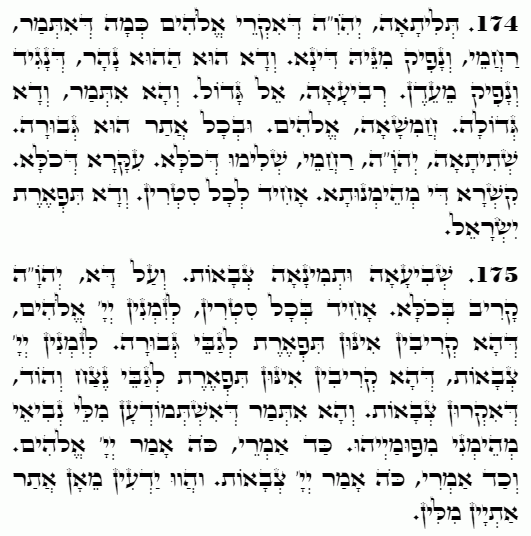Daily Zohar # 4517 – Vayikra – The ‘great’ is Chessed
Daily Zohar 4517

Hebrew translation:
175. הַשְּׁבִיעִי וְהַשְּׁמִינִי – צְבָאוֹת. וְלָכֵן יְהֹוָ”ה קָרוֹב בַּכֹּל. אָחוּז בְּכָל הַצְּדָדִים, לִפְעָמִים ה’ אֱלֹהִים, שֶׁהֲרֵי הֵם קְרוֹבִים תִּפְאֶרֶת לִגְבוּרָה. לִפְעָמִים ה’ צְבָאוֹת, שֶׁהֲרֵי הֵם קְרוֹבִים תִּפְאֶרֶת לְנֵצַח וְהוֹד, שֶׁנִּקְרָאִים צְבָאוֹת. וַהֲרֵי נִתְבָּאֵר שֶׁנּוֹדָעִים דִּבְרֵי הַנְּבִיאִים הַנֶּאֱמָנִים מִפִּיהֶם, כְּשֶׁאוֹמְרִים כֹּה אָמַר ה’ אֱלֹהִים, וּכְשֶׁאוֹמְרִים כֹּה אָמַר ה’ צְבָאוֹת, וְהָיוּ יוֹדְעִים מֵאֵיזֶה מָקוֹם בָּאִים הַדְּבָרִים.
.
Zohar Vayikra
Continued from previous DZ
#174
After explaining the first two names, אהיה AHYH and יה YH, which are Keter and Chokmah (#168), he explained the third name for Binah, YHVH, called Elokim. We learned that Binah is essentially mercy, but from it comes judgment. Therefore, the writing is יהוה YHVH, mercy, and the reading (Nikkud) is Elokim, judgment. Binah is that river that flows out of Eden.
The fourth name is “אֵל גָּדוֹל” “Great God,” and we have already learned that ‘Great’ is Gedulah, that is, the Sefirah of Chessed. The fifth name is “אֱלֹהִים” “Elokim”, which is Gevurah. The sixth name is “יְהֹוָה” YHVH, mercy, which is the perfection of everything, the bond of faith, holding all six sides: Chessed, Gevurah, Tiferet, Netzach, Hod, Yessod. This is called “תִפְאֶרֶת יִשְׂרָאֵל”, the Glory of Israel.
#175
The seventh and eighth names are called together, “צְבָאוֹת” Tzevaot, which are Netzach and Hod. Therefore, the name יהוה YHVH, which is Tiferet, is close to all, holding all sides. Sometimes, it is written, “יהוה אֱלֹהִים” YHVH Elokim, indicating that Tiferet is close to Gevurah. And sometimes, it is written, “יהוה צְבָאוֹת” “YHVH Tzevaot,” suggesting that Tiferet is close to Netzach and Hod, which are called “צְבָאוֹת” “Tzevaot.” We have learned from the words of the faithful prophets, when they said, “כֹּה אמר יְהוָה אֱלֹהִים” “Thus says YHVH Elokim,” and when they said, “כֹּה אָמַר יהוה צְבָאוֹת” “Thus says YHVH Tzevaot,” they knew from which place the words of prophecy came.
{||}

 Previous: Vayikra
Previous: Vayikra
